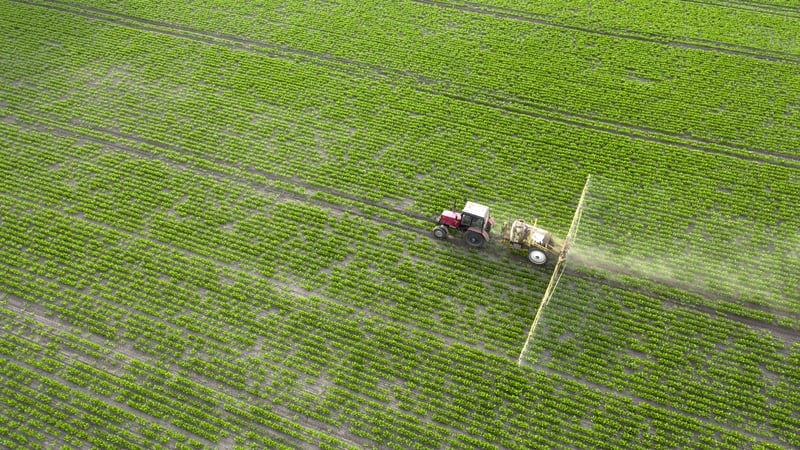
Uisce Éireann detected 52 cases of pesticides that exceeded allowable amounts in drinking water last year.
These incidents were not a threat to public health, according to the body, which is part of a coalition now urging farmers, gardeners and those maintaining sporting facilities to use alternatives to pesticides or to ensure they are used responsibly.
Significant progress has been made in recent years in reducing the impact of pesticide use on public water sources, with the number of pesticide exceedances in public water supplies down 50% since 2018.
A pesticide exceedance occurs when the level of a substance found exceeds what is deemed allowable under EU law.
The threshold is generally one tenth of one millionth of a gram of pesticide per litre.
Last year, there were more than 50 such exceedances detected, according to Dr Pat O’Sullivan, Uisce Éireann’s Drinking Water Compliance Senior Manager.
He said: “In public drinking water supplies, exceedances for pesticides were detected 52 times nationally in 2023.
“While our consultation with the HSE has concluded that the levels we are detecting do not represent a threat to public health, they are still however undesirable in drinking water, and it is therefore imperative that users of pesticides are mindful of best practice when using herbicides or pesticides and seek out alternatives.”
Uisce Éireann and other State bodies such as the Environmental Protection Agency, the Department of Agriculture, the HSE and the main farming organisations are all part of the National Pesticide and Drinking Water Action Group (NPDWAG).
The NPDWAG are now urging farmers, gardeners and those maintaining sports grounds to use alternatives to pesticides where possible, and if using the chemicals, to consider the vulnerability of their local drinking water supplies to pesticide contamination.
“Pesticides must only be used where strictly necessary and only after the possibility of using other control methods has been carefully considered.
“Minimising pesticide use not only helps to protect water quality but also has many wider environmental benefits,” it said.
Chair of the NPDWAG Dr Aidan Moody said the “good work” done by farmers and other users of pesticides to protect water quality needs to be a “sustained effort” by all stakeholders to make further progress.
He added: “Users of pesticides must always carefully consider the possibilities for alternative control methods in the first instance and if the application of pesticides is considered essential, make sure that they follow best practice measures to protect water quality.”
The group acknowledged that pesticide users have succeeded in reducing exceedances in some areas, but others still need attention.
“Great progress has made by the farming community and other pesticide users, particularly in the priority catchment areas of Newport, Co Mayo, and Clonroche, Co Wexford, where pesticide exceedances have been eliminated.
“However, there are other areas prioritised for action where Uisce Éireann has detected recurring pesticide exceedances from our monitoring programmes, including Belturbet in Co Cavan and Foynes Shannon Estuary, Co Limerick,” it said.
The term ‘pesticides’ covers chemicals used for the control of unwanted crop pests (commonly weeds, fungi and insects), biocidal products, such as wood preservatives and disinfectants and herbicides used to prevent, destroy, or control plant growth.
The number of public water schemes with elevated levels of pesticides above the allowed standard is said to be low in Ireland, but pesticides can enter water sources because of run-off from weed control products on hard surfaces during gardening, agriculture or forestry.
According to Uisce Eireann, the detection of an individual pesticide at levels above the allowed value indicates there may have been careless or excessive use of a product in or near a drinking water catchment.
Source link
 TG4 TV PC to TV
TG4 TV PC to TV
